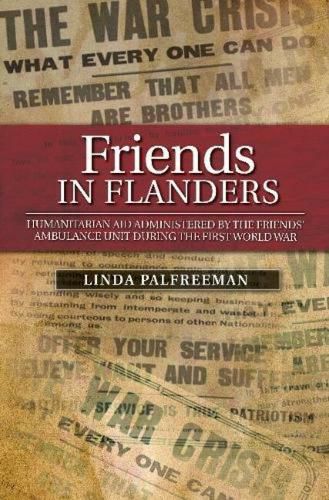Readings Newsletter
Become a Readings Member to make your shopping experience even easier.
Sign in or sign up for free!
You’re not far away from qualifying for FREE standard shipping within Australia
You’ve qualified for FREE standard shipping within Australia
The cart is loading…






The Friends Ambulance Unit (FAU) was created shortly after the outbreak of war. The idea of the units founder, Philip J Baker, was that it would provide young Friends (Quakers) with the opportunity to serve their country without sacrificing their pacifist principles. The first volunteers went to Belgium on 31 October 1914, under the auspices of the Joint War Committee of the British Red Cross Society and the Order of St John of Jerusalem. The FAU made a sustained contribution to the military medical services of the Allied nations, establishing military hospitals, running ambulance convoys, and staffing hospital ships and ambulance trains, treating and transporting wounded men. Determined to bring succour to all those in need, the FAU also assisted civilians trapped in the war zone and living in desperate circumstances. Nowhere was this more acute than in the besieged and battered town of Ypres where thousands sheltered in the underground passage-ways of the towns ancient fortifications – a subterranean population, hopeless, often lightless, wrote Geoffrey Young, the Units young field commander, living on what they might and breeding disease. The Unit provided hospitals for the treatment of civilians, and worked intensively in the containment and treatment of the typhoid epidemic that swept the region, locating sufferers, providing them with medical care, and inoculating people against the disease. It played a major role in the purification of the towns contaminated drinking water, distributed milk for infants and food and clothing to the sick and needy. It helped found orphanages, made provision for schooling and organised gainful employment for refugees until, finally, it became responsible for the definitive evacuations of the civilian population.
$9.00 standard shipping within Australia
FREE standard shipping within Australia for orders over $100.00
Express & International shipping calculated at checkout
The Friends Ambulance Unit (FAU) was created shortly after the outbreak of war. The idea of the units founder, Philip J Baker, was that it would provide young Friends (Quakers) with the opportunity to serve their country without sacrificing their pacifist principles. The first volunteers went to Belgium on 31 October 1914, under the auspices of the Joint War Committee of the British Red Cross Society and the Order of St John of Jerusalem. The FAU made a sustained contribution to the military medical services of the Allied nations, establishing military hospitals, running ambulance convoys, and staffing hospital ships and ambulance trains, treating and transporting wounded men. Determined to bring succour to all those in need, the FAU also assisted civilians trapped in the war zone and living in desperate circumstances. Nowhere was this more acute than in the besieged and battered town of Ypres where thousands sheltered in the underground passage-ways of the towns ancient fortifications – a subterranean population, hopeless, often lightless, wrote Geoffrey Young, the Units young field commander, living on what they might and breeding disease. The Unit provided hospitals for the treatment of civilians, and worked intensively in the containment and treatment of the typhoid epidemic that swept the region, locating sufferers, providing them with medical care, and inoculating people against the disease. It played a major role in the purification of the towns contaminated drinking water, distributed milk for infants and food and clothing to the sick and needy. It helped found orphanages, made provision for schooling and organised gainful employment for refugees until, finally, it became responsible for the definitive evacuations of the civilian population.